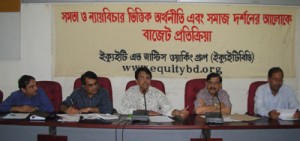 Dhaka 12 june 2008: Equity and justice working group organized a post budget dialogue on the proposed national budget of Bangladesh of 2008 – 2009 FY. This dialogue was to facilitate people’s expectation to fed in to the proposed one. A number of civil society organizations , representatives of different professional group , representatives of leading political parties were participated in the dialogue and put forward their concern to make national budget pro poor and growth oriented wherein people would have equitable and justified access to the resources. Among others, Mr. Rashed Al Titumir of Unnayan Onneshan, Mahmudur Rahman Manna of Bangladesh Awami league, Samsuzzaman Dudu of BNP, Golam Mortoza editor of Saptahik, Ahmed Swopon Mahmud of Voice , Maliha Shajahn of APIT, Sharif –e- Kafi of BDPC were present and expressed their views and thought to make the budget pro- poor.
Dhaka 12 june 2008: Equity and justice working group organized a post budget dialogue on the proposed national budget of Bangladesh of 2008 – 2009 FY. This dialogue was to facilitate people’s expectation to fed in to the proposed one. A number of civil society organizations , representatives of different professional group , representatives of leading political parties were participated in the dialogue and put forward their concern to make national budget pro poor and growth oriented wherein people would have equitable and justified access to the resources. Among others, Mr. Rashed Al Titumir of Unnayan Onneshan, Mahmudur Rahman Manna of Bangladesh Awami league, Samsuzzaman Dudu of BNP, Golam Mortoza editor of Saptahik, Ahmed Swopon Mahmud of Voice , Maliha Shajahn of APIT, Sharif –e- Kafi of BDPC were present and expressed their views and thought to make the budget pro- poor.
Syed Aminul Hoque in his key note presentation on proposed budget said; although the budget proposed increased amount of allocation to social safety net projects and to other prime sectors like agriculture but these subsidy likely to benefit urban middle class and rural elites. Syed Aminul commented Social Safety Net dominated budget as the budget of relief oriented and to satisfy immediate needs not really looking at the long term measures of poverty reduction. The proposed budget is heavily relied on deficit financing from the external sources, which will make country more indebted to the international financial institutions. Syed Aminul pointed that the government could follow the recommendations of Public Expenditure Review Commission, which has been framed while 4-party alliance was in power. Again, analysis of the implementation of previous year’s budget shows that expenditure in service and human development sectors like health and family Planing power and energy etc. was comparatively less than the other sectors like defense, public works etc, which is increasing human poverty as well as widening rural-urban as well as rich-poor gap.
In the open discussion many of the discussant indicated power and agriculture subsidy as discriminatory and unjustified while around 90 percent of these subsidy is spent to satisfy luxury of urban people. Speakers in the dialogue demanded withdrawal of fossil fuel subsidy from the non-agriculture/ non-productive sectors. They also proposed several specific recommendation to reduce fossil fuel dependency; like-
[#]Obligatory utilization of energy efficient bulbs
[#]Fixing air condition at 26 degree temperature
[#]Car free day in a week
[#]Limited and controlled utilization of government vehicles
[#]Proportion of solar energy
[#]Making public transport system convenient and friendly
[#]Ban on the import of high CC cars
he speakers also opposed the present concept of attaining food security as this concept undermines peoples’ rights on production system, farmers’ indigenous knowledge and make farmer dependent on multi-national companies for agricultural inputs.
Download Related Paper [Budget Framework Presentation] [Presentation 2]









